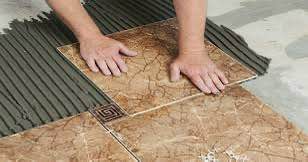Parking areas are among the most frequently used parts of a building. Therefore, it’s crucial to consider the materials used for various sections of the parking lot. One of the most essential components is the flooring, which must have good resistance to impact, pressure, moisture, cleaning agents, and heat.
Various materials such as stone, mosaic, or ceramic tiles are used to cover parking floors. These building materials come in various designs and colors. However, their primary importance lies in their durability.
But how can we confidently choose one of the available materials in the market, and how can we be sure whether mosaic or ceramic tiles are better for parking floors? To find answers to these questions, let’s examine the advantages and disadvantages of ceramic and mosaic.
⸻
Comparing the Features of Ceramic Tiles and Mosaic for Parking Floors
To make it easier to choose between mosaic and ceramic for your parking floor, consider the following points. Then, based on your needs and these factors, you can make an informed decision.
1. Durability: Which Lasts Longer?
Perhaps as you’re reading this article, you’ve chosen porcelain tiles as your preferred option. However, you’re not familiar with the differences between mosaic and ceramic and want to make a more informed decision. Now that you’ve considered ceramic, let’s explore the features of each.
2. Resistance to Pressure and Impact: Which is Stronger?
Both mosaic and ceramic tiles have good resistance to pressure and impact. Therefore, if you’re choosing between mosaic and ceramic for the parking floor based solely on their resistance, it’s important to note that porcelain tiles with a thickness of 20 mm have very high strength and can withstand significant pressure.
3. Moisture Resistance: Which is More Resistant?
If you use porcelain tiles for the parking floor, you can rest assured about moisture absorption. These types of ceramics rarely absorb water and can be comfortably used in frequently washed parking areas.
Ceramic absorbs much less water compared to mosaic. Therefore, if you’re looking for a moisture-resistant flooring, ceramic is the better choice.
4. Frost Resistance: Which is More Resistant?
Porcelain tiles have higher frost resistance. If you’re wondering whether ceramic is suitable for parking floors, the answer is yes. One of the reasons for flooring damage is the lack of resistance to expansion and contraction.
Porcelain tiles do not absorb much water, so they do not freeze even when exposed to severe cold. In other words, expansion and contraction cannot damage them. Therefore, ceramic can easily be used in cold areas.
Mosaics also withstand extreme cold and heat, but their water absorption is slightly higher than porcelain tiles, making them less effective against freezing.
5. Installation Cost: Which is Higher?
If you’re still unsure whether mosaic or ceramic is better for the parking floor, consider the installation cost as well. The installation cost of mosaic is higher than that of ceramic.
Therefore, if you want to choose a beautiful, colorful, and durable flooring that doesn’t have a high installation cost, ceramic tiles are likely the better choice, as they are much easier to install than mosaic.
6. Cleaning: Which is Easier?
Ceramic tiles are hygienic building materials that are highly regarded for being antibacterial. Various ceramics have high resistance to detergents and chemicals, making them easy to clean.
Since cars frequently move in parking areas, it’s natural for this part of the building to get dirty and may need cleaning once a week. Fortunately, both mosaics and ceramics are easy to wash. However, ceramic tiles, due to their low water absorption, don’t stain easily and are cleaned quickly.
7. Design Variety: Which Offers More Options?
Ceramics are newer building materials with a wide range of designs and colors. While mosaics also come in various designs and colors, they don’t match the beauty and attractiveness of ceramics. Ultimately, everyone can choose the design and color they prefer based on their taste.
8. Fire Resistance: Which is More Resistant?
New ceramics, especially porcelain tiles, are fired at very high temperatures, close to 1210 degrees Celsius. This shows how resistant they are to heat and temperature changes.
Therefore, if you’re worried about fire, ceramic is a high-resistant material made according to high standards, with exceptional fire and heat resistance.
9. Slip Resistance: Which is More Resistant?
Slip resistance might be very important for places like yards or floor halls. However, because cars mostly move in parking areas, slip resistance becomes important when moisture reaches the surface.
Since most parking areas are covered and not frequently exposed to rain or snow, their floors don’t become slippery. However, it’s worth noting that mosaics are more slip-resistant than ceramics.
Therefore, if slip resistance is important to you, it’s better to choose mosaic over ceramic, as ceramics become slippery when wet.
10. Price: Which is More Expensive?
Comparing the price of ceramic to mosaic may not be very logical since each of these building materials is made of different materials and has various features. Therefore, it’s natural that ceramic might be more expensive than mosaic due to its numerous positive attributes and attractive appearance.
⸻
Final Thoughts
In this article, we’ve examined the features of mosaic and ceramic tiles. Now it’s your turn to decide which is better for your parking floor and which is more suitable for your needs.
Both of these building materials are of high quality and widely used. However, each person should choose one of these two options based on their budget and taste. By reviewing the features of mosaic and ceramic, you can make a more informed decision > Soheila Project Manager: 🖼 Photo




